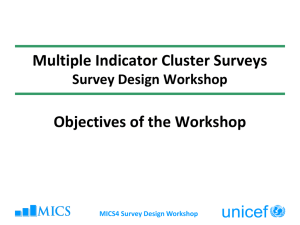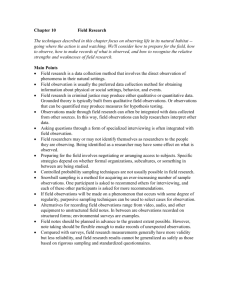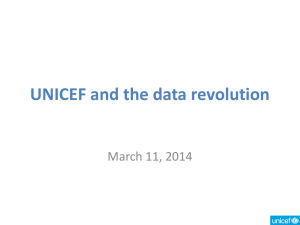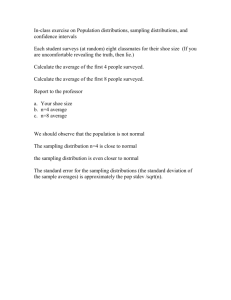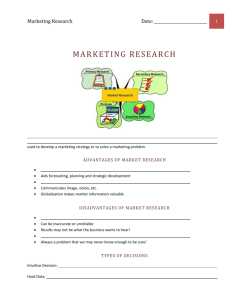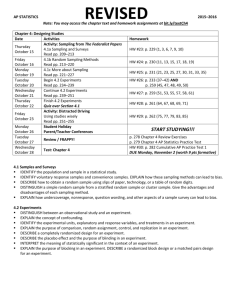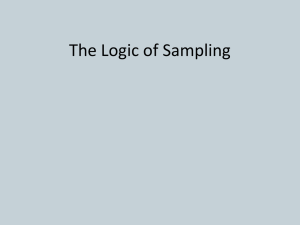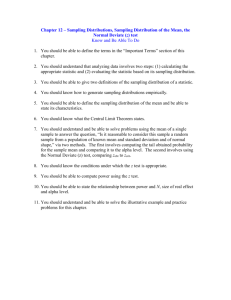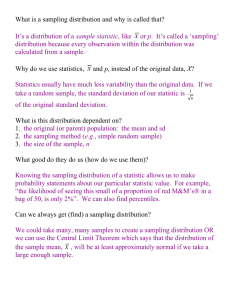Terms of Reference
advertisement
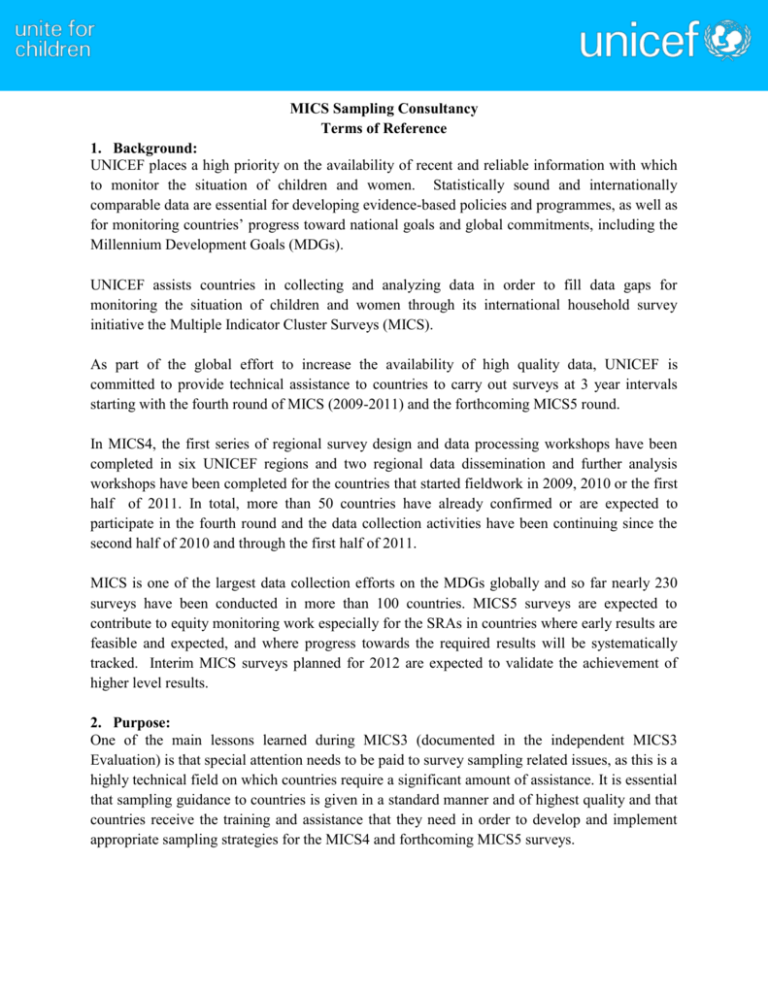
MICS Sampling Consultancy Terms of Reference 1. Background: UNICEF places a high priority on the availability of recent and reliable information with which to monitor the situation of children and women. Statistically sound and internationally comparable data are essential for developing evidence-based policies and programmes, as well as for monitoring countries’ progress toward national goals and global commitments, including the Millennium Development Goals (MDGs). UNICEF assists countries in collecting and analyzing data in order to fill data gaps for monitoring the situation of children and women through its international household survey initiative the Multiple Indicator Cluster Surveys (MICS). As part of the global effort to increase the availability of high quality data, UNICEF is committed to provide technical assistance to countries to carry out surveys at 3 year intervals starting with the fourth round of MICS (2009-2011) and the forthcoming MICS5 round. In MICS4, the first series of regional survey design and data processing workshops have been completed in six UNICEF regions and two regional data dissemination and further analysis workshops have been completed for the countries that started fieldwork in 2009, 2010 or the first half of 2011. In total, more than 50 countries have already confirmed or are expected to participate in the fourth round and the data collection activities have been continuing since the second half of 2010 and through the first half of 2011. MICS is one of the largest data collection efforts on the MDGs globally and so far nearly 230 surveys have been conducted in more than 100 countries. MICS5 surveys are expected to contribute to equity monitoring work especially for the SRAs in countries where early results are feasible and expected, and where progress towards the required results will be systematically tracked. Interim MICS surveys planned for 2012 are expected to validate the achievement of higher level results. 2. Purpose: One of the main lessons learned during MICS3 (documented in the independent MICS3 Evaluation) is that special attention needs to be paid to survey sampling related issues, as this is a highly technical field on which countries require a significant amount of assistance. It is essential that sampling guidance to countries is given in a standard manner and of highest quality and that countries receive the training and assistance that they need in order to develop and implement appropriate sampling strategies for the MICS4 and forthcoming MICS5 surveys. In order to ascertain this objective; UNICEF requires the support of external sampling expertise and the assignment under this contract will be to: 1) Prepare recommendations for the preparation of the MICS5 Listing Manual, 2) Provide recommendations for the preparation of the MICS5 sample weight and sampling error calculation programmes and related guidelines, 3) Prepare the Sampling presentation for the MICS5 Survey Design Workshop by reviewing the MICS4 presentation and relevant documents associated with the presentation, 4) Review the English, French and Spanish versions of the relevant sections and chapters of MICS4 Manual on Sampling and provide a written review to help guide the preparation of MICS5 Manual, 5) Review and revise the MICS4 document describing (for the third party users of MICS datasets) which variables they should be using and how they should be using these to calculate sampling errors (strata, clusters etc.) for use in MICS5, 6) Prepare a guideline document about design effects that (a) explains design effects, (b) discusses when and how design effects can be very high or low, (c) discusses why very low design effects are observed for some domains and for some indicators in some surveys, 7) Upon request by UNICEF, review, revise, and send feedback about the sampling plans developed by the statistical agencies implementing the MICS during the contract period, 8) Upon request by UNICEF, review, advise or, if necessary, calculate the sample weights for countries after the data collection is completed before they proceed with the data analyses, 9) Upon request by UNICEF, visit MICS implementing countries to discuss the sampling plans, 10) Upon request by UNICEF, review the relevant chapters of the MICS country reports. With the exception of visits to MICS implementing countries and UNICEF HQ, consultancy work can be done from a remote location. Duty station need not be New York Headquarters. 3. Expected results: (measurable results) Comprehensive, high quality, MICS sampling guidance, templates and technical support available to MICS4 countries and to UNICEF global MICS Team to be used for MICS5 preparations 4. Duration: Start date: 1 September 2011 End date: 30 June 2012 Total number of working days: 84 5. Travel: 3 trips to visit MICS implementing countries to discuss the sampling plans (countries may change): Tunisia: Airfare $4,900, DSA $200/day, Terminals $152, Estimated Total Cost $6,252 Barbados: Airfare $ 600, DSA $360/day, Terminals $152, Estimated Total Cost $2,912 Uruguay: Airfare $ 3,000, DSA $253/day, Terminal $152, Estimated Total Cost $4,670 1 trip to UNICEF HQ, New York for discussing the sampling realted issues for MICS5 New York: Airfare $ 600, DSA $378/day, Terminals $152, Estimated Total Cost $3,020 6. Activities, resources, deadlines 1. Prepare recommendations for the preparation of the MICS5 Listing Manual Deliverables: Report on the revisions required for MICS5 Listing Manual Number of working days: 4 days Deadline: 31 October 2011 2. Provide recommendations for the preparation of the MICS5 sample weight and sampling error calculation programmes and related guidelines Deliverables: Report on the revisions required for MICS5 sample weight and sampling error calculation programmes Number of working days: 4 days Deadline: 31 October 2011 3. Prepare the Sampling presentation for the MICS5 Survey Design Workshop by reviewing the MICS4 presentation and relevant documents associated with the presentation Deliverables: 1) Sampling presentation for MICS5 Survey Design workshop Number of working days: 3 days Deadline: 31 October 2011 4. Review the English, French and Spanish versions of the relevant sections and chapters of MICS4 Manual on Sampling and provide a written review to help guide the preparation of MICS5 Manual Deliverables: Review report with suggested changes and additions to relevant sections and chapters of the MICS5 Manual on sampling Number of working days: 7 days Deadline: 31 October 2011 5. Review and revise the MICS4 document describing (for the third party users of MICS datasets) which variables they should be using and how they should be using these to calculate sampling errors (strata, clusters etc.) for use in MICS5 Deliverables: Review report with suggested changes and additions Number of working days: 3 days Deadline: 31 October 2011 6. Review and revise the MICS4 guideline document about ‘design effects’ for use in MICS5 Deliverables: Review report with suggested changes and additions Number of working days: 3 days Deadline: 31 October 2011 7. Upon request by UNICEF, review, revise, and send feedback about the sampling plans developed by the statistical agencies implementing the MICS during the contract period Deliverables: Report with feedback and suggestions for each country Number of working days: Maximum 21 days. UNICEF will request the consultant to carry out a maximum number of 7 country sampling plan reviews under this contract. Each country sampling plan review is expected to take on average 3 days to complete. Deadline: The reviews will be carried out upon request, as need arises 8. Upon request by UNICEF, review, advise or, if necessary, calculate the sample weights for countries after the data collection is completed before they proceed with the data analyses, Deliverables: Review Reports Number of working days: 10 for 5 countries Deadline: The reviews will be carried out upon request, as need arises 9. Upon request by UNICEF, visit MICS implementing countries to discuss the sampling plans Deliverables: Review Reports Number of working days: 12 for 3 countries Deadline: The visits will be done upon request, as need arises 10. Upon request by UNICEF, review the relevant chapters of the MICS country reports Deliverables: Review sampling related chapters of the MICS Country Reports Number of working days: 10 for 5 country reports Deadline: The reviews will be carried out upon request, as need arises 7. Key skills, technical background, and experience required: At least a Master’s Degree or equivalent in Survey Sampling or Statistics with special expertise in survey sampling At least 15 years experience in designing samples for household surveys (experience in countries without recent census information highly desirable) around the globe Must have expertise with the sampling methodology of MICS and/or Demographic and Health Surveys (DHS) Demonstrated training experience Experience of working in developing countries Excellent communication and interpersonal skills Fluency in English and at least one of the following languages: Spanish, French Demonstrated ability to work in a multicultural environment 8. Application Procedures: Qualified candidates are requested to submit a cover letter, CV and P 11 form (which can be downloaded from our website at http://www.unicef.org/about/employ/index_53129.html) to pdconsultants@unicef.org by July 27 2011 with subject line: MICS Sampling Consultancy. Please indicate your ability, availability and daily/monthly rate to undertake the terms of reference above. Applications submitted without a daily/monthly rate will not be considered. For additional information regarding MICS4, please visit http://www.childinfo.org/mics4.html.

